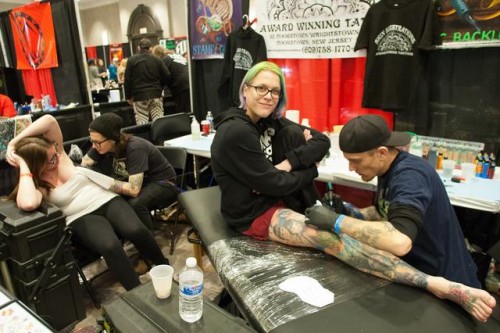Photos: The DC Tattoo Expo Is Thriving … In Virginia

Click here to view original web page at dcist.com

Photo by Francis Chung)
Ever wondered why the annual DC Tattoo Expo is held in Virginia instead of in the District?
According to organizer Greg Piper, it's because the nation's capital has become increasingly inhospitable to the tattoo industry.
Speaking at the sixth iteration of the event, which took place from Friday to Sunday, the tattoo artist and owner of Manassas' Exposed Temptations Tattoo said that, although "D.C. is one of those places that people don't really look at as having a subculture or an art culture," enthusiasm for tattoos is "really big here."
As evidence, Piper pointed to the continued success of the Expo, which brought well over 400 tattoo artists, vendors, and industry celebrities to Arlington's Crystal Gateway Marriott. Thousands came to get tattooed, watch skilled craftspeople at work, gawk at the tattoo and pin-up contests, show off their own ink, or simply connect with a likeminded community.
But Piper points to problems looming over the local industry, most notably the D.C. Department of Health's proposed Tattoo, Body Art, and Body-Piercing Facility Regulations, part of a legislative process that dates back to 2011.
The District's tattoo industry was essentially unregulated until 2012, when the D.C. Council enacted licensing requirements for tattoo artists along with basic health and safety standards for facilities. Issued last October, the proposal for additional regulation currently under consideration is the third version drafted by the DOH since 2013. Previous iterations faced vehement criticism and underwent revisions that eliminated provisions such as a mandatory 24-hour waiting period in advance of getting a tattoo.
Among the latest proposal's controversial elements is a stipulation that all equipment and materials used in tattoo shops must be purchased from suppliers registered with the city's health department. An online petition opposing the rule notes that there is currently no method of registering with DOH, and argues that passing the regulation would make it difficult, if not impossible, for shops to legally furnish themselves and do business within the District.
"D.C. is basically trying to ban tattooing within the city limits through regulation," Piper claimed. "Some of the stuff they're doing, to my knowledge, is just ridiculous. It has no health base whatsoever."
And it has had an impact on how he runs the Expo. "This is why I do the show in Virginia, and not in D.C. proper," Piper said. "I can't invest in future shows and then worry when 2017, 2018 comes around, are we going to be able to have those shows? So, it keeps us out of the city. We'd like to have a proper D.C. show, but if the city doesn't want us, it's not a battle we're fighting. Arlington's happy to have our money."
As he prepared to work on a client in his booth at the Expo, tattoo artist James Hughes, owner of the acclaimed Bethesda Tattoo, echoed many of Piper's sentiments.
"The D.C. government is actually being kind of unreasonable and a little hostile toward the tattoo business today more so than I've ever heard of it being," opined Hughes, who once operated in the District, but moved shop to Maryland in 2005.
"I don't know if it's against tattooing, I just think that they don't know what to do with it," he added. "I think they want to generate revenue from it, and they just haven't quite figured out exactly how they're going to do that."
Walking through the Expo's bustling halls and ballrooms, there was indeed a noticeable dearth of booths representing studios and vendors based in the District proper, though Piper estimated that approximately ten studios from the greater metropolitan area had an official presence at the event.
Paul Roe, owner of H Street's Britishink Tattoos, did not attend this year's Expo (though his shop had a booth on site). When reached afterward, he seemed much more sanguine than Piper about the state of the industry in the District.
"The scene is strong," he said, emphasizing that "corporate" and "over-commercialized" events like the Expo do not necessarily present an accurate picture of the city's tattoo community.
"There are solid shops with solid artists everywhere in D.C.," Roe said, noting that not all of them see enough value in the Expo in terms of earnings and exposure to make it worthwhile for them to participate.
Roe stated that existing regulations, such as the artist-licensing requirement, don't affect his business at all. As for the latest regulation proposal, he thinks it is unlikely to pass.
Roe claims that requiring suppliers (which are scattered across the globe) to be specifically registered in D.C. is "the only instance of that anywhere in the world." He believes that the idea is logistically unfeasible and could lead to unfair business practices, such as potentially monopolistic advantages for any supplier that does manage to register with the city. He also worries that only low-quality, disreputable suppliers would bother to get licensed in such a relatively small market.
For these reasons, Roe is confident that the proposals will ultimately be further revised. "These will not be the regulations on tattoo, body art, and body-piercing facilities in D.C.," he predicted. "It will resolve itself, it's just going to take some time."
A thirty-day public comment period on the current DOH proposal expired last November, and no dates have been given as to when further action, such as a public hearing, might be taken.
Politics aside, the Expo continued to serve as a festive hub for tattoo professionals and enthusiasts from the capital region and beyond. Even as the D.C. tattoo industry continues to push back against proposed regulations, the local tattoo culture showed plenty of signs that it's continuing to thrive.
Click here to view original web page at dcist.com
January 19, 2016


